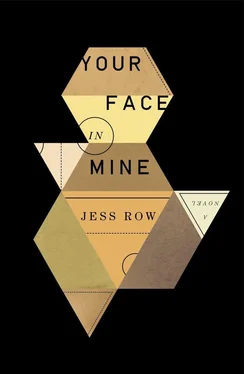Speaking of which, I say, you have to tell me who I’m talking to. Martin Wilkinson, the figure at the center of my book, the person , or Martin Wilkinson the businessman?
Are they different? They’re not different.
I didn’t sign up to write Iacocca .
You don’t have to. It’s a compelling story in itself. Look, either way I’m selling the concept, aren’t I? Why should it surprise anybody that I have some skin in the game? So to speak. Anyway, look, Kelly, take your time. Remember: we’re here for as long as you need. And really, what I wanted to talk with you about now , before you meet Silpa, is you. How you’re doing. How you’re feeling . I dropped a hell of a bombshell on you and we haven’t even hardly discussed it.
Of course, I’m thinking, of course he would wait until the very last moment to bring it up. On the plane, I came prepared to talk — notepad, laptop, iPod, and all — but as soon as the dessert course was cleared he popped two pills with a double Glenlivet, reclined his seat, turned on his side, and slept till we landed. Whereas I drowsed into my headphones, fitfully, finally giving up and reading the Lonely Planet nearly cover to cover. He’s avoiding something, I thought, staring at the magenta hump of his shoulder, the thin Thai Air blanket wrapped around him like a fashionable winding sheet. Abiding. It’s an Art of War move. I had to smile at that. At least, I thought, I know how I’m being played.
I’m doing okay, I say. I think I’m adjusting. To a different scale of things. More dimensions. More questions.
What the hell does that mean?
It means, I say, trying to sound only a little irritated, I’m working through osmosis. Like you said. Bit by bit. You expect me to be coherent? I just got here. It’s three in the morning my time. Don’t ask me to explain it now.
Fair enough, he says. I won’t rush you.
• • •
After forty-five minutes, through two major traffic jams and three slowdowns, after I’ve rolled the window up and down five times, trying to balance the slamming heat and the roiling in my stomach, we pull off the highway into a bustling concrete-block commercial area, the buildings all about six stories — a furniture showroom, a motorcycle dealership in bright yellows and reds, a 7-Eleven, a glassed-in restaurant with an English sign saying Halal Huice Coffee House . This is Bangkok, then, I’m thinking, the everyday city, the city as it is, not as the tourists or city planners wish it was. Not as I or Martin wish it was. Now that we’re off the highway the traffic has slackened to a manageable six lanes, a constant stream of buses, pink and yellow and green taxis, tuk-tuks, and the omnipresent whining low-cc motorcycles. If I have dreams about Bangkok, I’m thinking, they’ll be signaled by the buzzing of motorcycles.
We’re here, Martin says, as Kham pulls to a stop behind a delivery van unloading bundles of bamboo. Sandwiched between a food stall and a cheap clothing store, set slightly farther back from the street than one would expect, there’s a set of shiny marble steps and a blue-tinted glass door with a white orchid and a circle of Thai script, including the letters M.D. Some of the tint has peeled off.
What does the sign say?
Silpasuvan East-West Medical Research Institute. Or something like that.
Not looking for off-the-street customers, are you?
We’re not looking for customers, period, Martin says. They find us. He laughs. All the great companies start in garages, don’t they? This is our garage. Look, man, don’t be nervous. He doesn’t bite. Geniuses, real geniuses, are nothing to be afraid of. Up close, anyway.
Based on your vast experience?
He stares straight ahead.
I’ve known two in my life, he says.
Who else? I ask. And then, as soon as the words have sounded, I know.
Do I really need to spell it out?
No.
Two is enough, I think, he says. For any one lifetime.
—
We cross through the doorway into a gust of cold, sterile air, hospital air, and remove our shoes, as one does everywhere in Thailand. Neat rows of shoes, expectantly, around every entranceway. With his big toe Martin scoots me a pair of black Chinese cloth slippers. Suki, he calls out, and from the end of a long corridor a tall, pale Thai woman in a royal blue business suit comes hurrying toward us, clacking her heels.
Mr. Kelly, she says, holding out her hand, and simultaneously I feel the thickness of the fingers, the mass of the knuckles, and look up at her cheekbones and the wideness of the jaw. A ladyboy, of course, as Martin said. A trans man. I’ve forgotten all the words. Very glad see you, she says. Sawatdi kha. Come this way, he’s waiting.
Suki is our one-person office staff, Martin says, a little too loudly, as we follow her back to the elevator. She’s been with Silpa forever. Since before he scaled back. Dr. Silpa was the number-one MTF doctor in Bangkok, isn’t that right, Suki? That’s male-to-female.
I was his patient, she says, holding the elevator door and ushering us in. Before that. A satisfied customer.
She smiles, widely, openly, and I note, as I never would otherwise, how difficult it must be to get up in the morning and lipstick yourself perfectly, pencil in the daggerlike eyebrows, spread the mascara to its right thickness. Which is not to say she’s different from any relatively flashy woman in any office. Or, rather, she is: but only because she has nothing to do with me. The thing about ladyboys, I read in the guidebook on the plane, is that they’re not trans sexuals in the accepted sense of the word, they’re not passing, they’re truly a third gender, with its own variety, its own continuum of appearance and attraction. This isn’t for you , her body says; this isn’t open to your scrutiny. These are just tools used for another purpose.
I think they say heat wave tomorrow, Suki says. The elevator is tiny, barely three inches above her head. Forty-two. You want to sit outside or inside?
Outside.
Too hot for Americans. She giggles.
My friend here gets a little carsick, Martin says. Agan kleun hyan. He needs the fresh air.
—
What I notice first about Silpa — what I remember, even now, as a thought process, an unfolding observation — is, my god, he’s small . He comes through the sliding glass doors, winds his way around an enormous slate planter filled with birds of paradise, and then emerges onto the terrace, where we’re sitting, next to a low gurgling waterfall, drinking iced jasmine tea, a tiny, very dark man in a lab coat, dark suit pants, and black rubber slip-on shoes that make no sound at all. A narrow, delicate face, high cheekbones, unnaturally large goldfishy eyes, long lashes. If I were to stand up — I’m not tall myself, five-seven on a good day — he would come up to my chin. I’m not sure he’s even five feet tall. Don’t get up, he says, waving us back down. At ease, at ease. He cups my outstretched hand, surrounding it with ten fingers, only momentarily, and lets go. Kelly Thorndike, he says. What a pleasure. Thank you for joining us here. You must find this whole phenomenon somewhat improbable.
It takes me a moment to respond. He seems to be in no hurry.
I did, I say, finally. When I first met Martin. Now I almost take it for granted.
Isn’t that astonishing? he says. Your mind takes only a moment to acclimate. Modernity at work. All that is solid melts into air. You know that quotation? Marx? Sometimes I think I should have that on my business card. Even if it makes the investors uncomfortable.
Martin gives a short chuffing laugh. I don’t think anyone would mistake you for a Communist, he says.
Читать дальше












